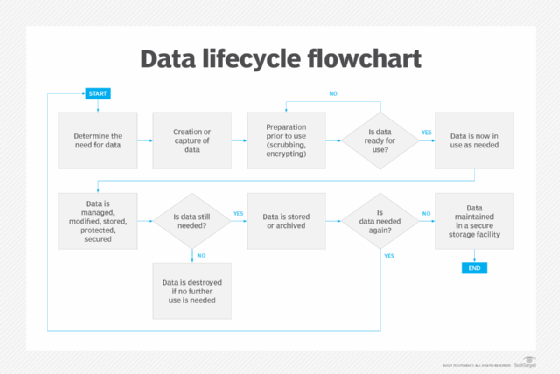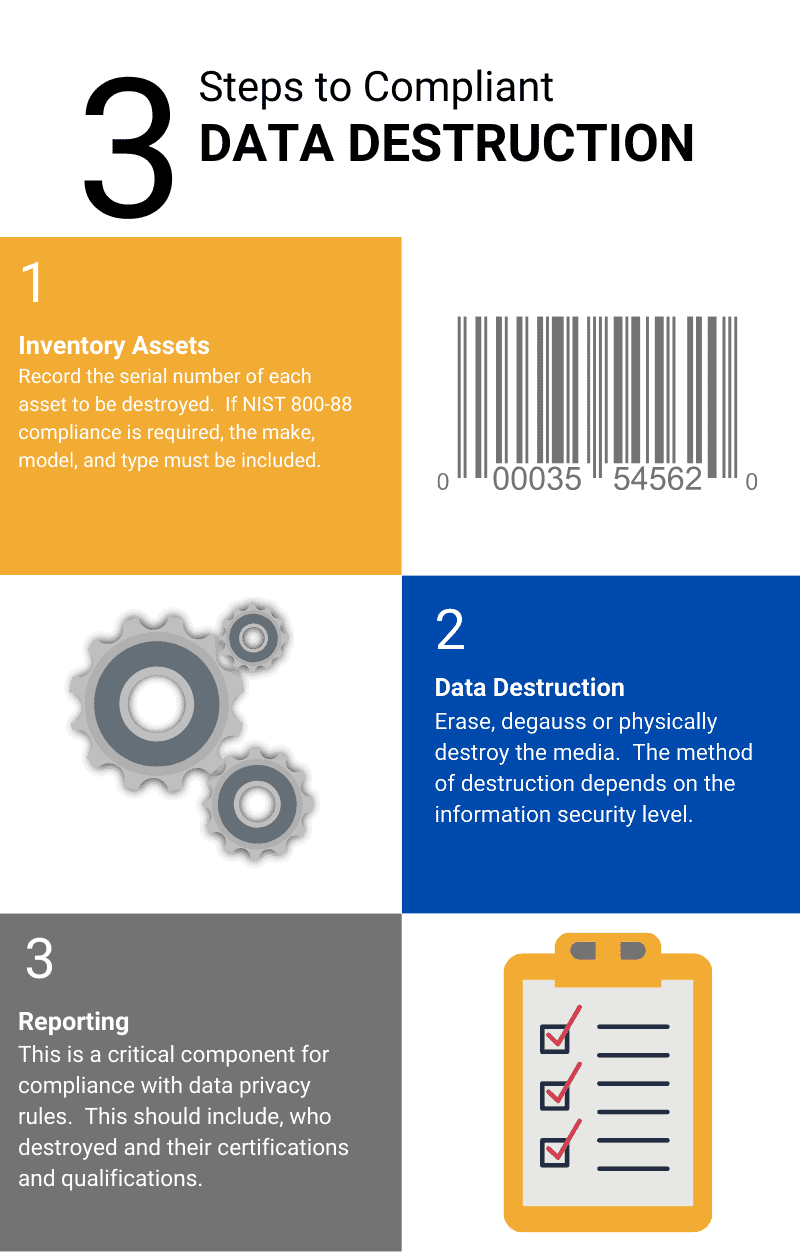The Necessary Nature of Data Destruction in Upholding Computer Safety And Security Solutions and Protecting Against Unauthorized Accessibility
In a period where data violations and identity theft are significantly prevalent, the importance of effective data damage can not be overemphasized. Organizations should identify that the failure to properly dispose of delicate info postures not only lawful and economic risks however also a prospective disintegration of client depend on. Various methods, from information wiping to physical destruction, function as vital safeguards versus unauthorized access. Understanding the implications of information devastation practices and conformity with policies raises vital inquiries about the competence of current techniques and their lasting stability in the face of advancing hazards.
Significance of Data Damage
In a progressively digital world, the relevance of data damage can not be overemphasized. As companies accumulate substantial quantities of sensitive information, the potential effects of stopping working to appropriately dispose and handle of that information become increasingly serious. Data breaches, identification burglary, and corporate reconnaissance posture substantial hazards, underscoring the necessity of efficient data destruction methods.

Moreover, as modern technology evolves, so also do the methods whereby destructive stars seek to make use of delicate information. Organizations needs to continue to be attentive and proactive in their data damage techniques to secure versus these evolving dangers. By focusing on information destruction, business not only shield their assets however likewise foster trust fund amongst clients and stakeholders, demonstrating a dedication to liable information management and safety techniques.
Approaches of Effective Information Destruction
To ensure the total and irreparable destruction of sensitive data, organizations can utilize a range of reliable approaches customized to their details demands. Among one of the most usual methods is data wiping, which involves using specialized software to overwrite existing data multiple times, making recovery virtually difficult. This is especially valuable for solid-state drives and difficult drives, where conventional removal methods are inadequate.
Another effective approach is degaussing, which makes use of solid electromagnetic fields to disrupt the magnetic domain names on storage space media, making the information irretrievable. This method is especially fit for magnetic storage tools, such as tape drives and hard drives.
Physical destruction is additionally a sensible alternative, entailing the shredding, crushing, or incineration of storage devices. This method guarantees that information can not be recuperated, making it optimal for organizations taking care of extremely sensitive details.

Conformity With Data Protection Laws
Organizations should not just concentrate on efficient information destruction techniques however additionally guarantee compliance with information defense laws that govern how sensitive info is taken care of and gotten rid of. Sticking to these laws is important wikipedia reference for securing individual information and keeping consumer trust fund. Regulations such as the General Information Defense Regulation (GDPR) in the European Union and the Health Insurance Mobility and Responsibility Act (HIPAA) in the USA enforce rigorous standards on information management, that include needs for the protected disposal of delicate info.
To accomplish conformity, organizations need to carry out detailed data devastation plans that straighten with these legal frameworks. This includes recognizing information that needs damage, establishing procedures for protected methodsâEUR" such as shredding physical media or utilizing software that meets sector requirements for data wipingâEUR" and keeping comprehensive records of destruction activities. Regular audits needs to be carried out to guarantee adherence to these policies and to recognize any type of potential locations for enhancement.
Failing to adhere to data defense regulations can bring about significant lawful implications, including large fines and damages to an organization's reputation. As a result, integrating conformity into information destruction methods is not just a legal commitment however additionally top article an important component of a durable information safety strategy.
Repercussions of Poor Information Handling
Poor data handling can result in extreme consequences that prolong past immediate operational obstacles. Organizations might face considerable monetary losses as a result of data breaches, which commonly cause costly remediation efforts, legal charges, and regulative penalties. These economic implications can strain resources and impede development, inevitably affecting an organization's profits.
Additionally, bad information handling can drastically damage an organization's credibility. Stakeholders, partners, and customers may lose rely on an entity that fails to protect sensitive details, leading to lowered consumer commitment and prospective loss of service chances. This disintegration of count on can take years to rebuild, if it can be restored in all.
In addition, companies might deal with legal implications occurring from non-compliance with information security laws. Such violations may cause penalties and investigations, worsening the monetary concern and further staining the company's image.
In the world of cybersecurity, inadequate data monitoring methods can produce vulnerabilities that make systems extra prone to unauthorized accessibility and cyberattacks. Eventually, these consequences underscore the essential relevance of carrying out robust information dealing with treatments to secure sensitive info and maintain business integrity.
Finest Practices for Secure Data Disposal


Firstly, data must be identified according to its level of sensitivity. Delicate info needs a lot more rigorous disposal techniques, such as shredding physical papers and making use of advanced software for digital data wiping. Utilizing qualified information destruction solutions ensures compliance with industry policies and requirements.
Secondly, organizations ought to execute an information disposal plan that mandates normal audits. This plan should describe the procedures for data retention and destruction, guaranteeing that outdated data is gotten rid of immediately and firmly. Educating workers on these procedures is necessary to promoting a culture of safety and security awareness.
Lastly, maintaining detailed documents of disposed information improves accountability and provides a clear audit route. This documents must include the kind of information ruined, the technique utilized, and the date of disposal.
Final Thought
Finally, the crucial of efficient data destruction is noticeable in its duty in improving computer security solutions and alleviating unauthorized access threats. Adopting durable approaches such as information wiping, degaussing, and physical destruction, together with conformity with regulations like GDPR and HIPAA, is essential for safeguarding delicate info. Neglecting appropriate data disposal methods can result in extreme consequences, consisting of data violations and legal consequences. Implementing finest techniques in protected information disposal ultimately strengthens business stability and customer count on.
In an age where information breaches and identity theft are progressively widespread, the significance of efficient information devastation can not be overemphasized. data destruction. Data breaches, identity theft, and company reconnaissance position significant dangers, highlighting the necessity of effective information damage techniques
Conformity with laws such as GDPR and HIPAA mandates that organizations execute stringent information protection measures, including the protected devastation of data at the end of its lifecycle.
By prioritizing data destruction, business not recommended you read just shield their properties yet additionally foster count on amongst customers and stakeholders, showing a dedication to responsible data management and safety methods.
Organizations need to not just concentrate on efficient data destruction techniques however likewise make sure compliance with information defense laws that regulate exactly how delicate information is dealt with and disposed of.